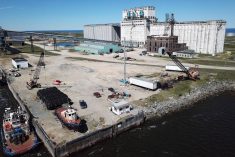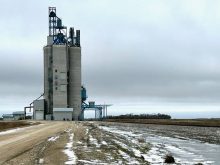Farm groups, grain shippers, crop processors and supply chain organizations are all praising Transport Minister Marc Garneau’s plan to make Canada’s grain transportation system more competitive.
But some farm groups are uneasy about the future of the maximum revenue entitlement (MRE).
Speaking to the Chamber of Commerce of Metropolitan Montreal Nov. 3 Garneau announced legislation in the spring will establish reciprocal penalties between shippers and railways in service-level agreements, better define adequate and suitable service, improve access to the Canadian Transportation Agency (CTA) and improve the timeliness of CTA decisions.
Read Also

Manitoba Ag Days 2026: Local businesses gear up for Brandon farm show
Most of agriculture is seemingly at Manitoba Ag Days each January: Manitoba agribusinesses and farm groups look forward to connecting with farmers at the 2026 show.
He also said the government would “address the future of the maximum revenue entitlement and extended interswitching.”
Some observers have speculated that if Garneau intends to scrap the MRE, as was recommended in a review of the Canada Transportation Act, the MRE would have no future.
Many, including most farm groups, are not opposed to tweaking the regulation to address some of its shortfalls, including how the MRE reflects car purchases by the railways.
“We will continue to work with stakeholders to ensure there’s a proper balance in place — one that supports rail customers and delivers continued investments in the system,” Garneau said. “That’s how we will create a freight rail system that is even more competitive and efficient in the long term.”
Garneau’s circumspection left the Canadian Federation of Agriculture and its Prairie affiliates, the Keystone Agricultural Producers (KAP), Agricultural Producers of Saskatchewan (APAS) and Alberta Federation of Agriculture (AFA) uneasy.
“It remains unclear what the government’s intentions are for the (MRE) regulation that protects farmers, who lack competitive options when it comes to shipping grain,” they said in a release.
Agriculture Minister Lawrence MacAulay didn’t offer any more detail about the MRE when he spoke to farm leaders by telephone Nov. 3, KAP president Dan Mazier said in an interview.
“MacAulay also said we need to keep his feet to the fire,” Mazier added.
The MRE allows the railways to charge whatever rate they want so long as total annual grain-shipping revenues don’t exceed the amount determined by the Canadian Transportation Agency through a formula created in 2000, which gave the railways a 20 per cent contribution to grain-shipping revenue over variable costs.
The MRE was a railway idea to ease farmers’ fears a lack of competition would allow the railways to overcharge them.
University of Manitoba agricultural economist Derek Brewin has said because grain shippers are captive to the railways, farmers would see their average grain-shipping costs at least double from around $36.60 a tonne to $78.52 without the MRE, but under certain conditions they could jump 150 per cent to $109.97.
KAP, APAS, the AFA, the Saskatchewan Wheat Development Commission and Saskatchewan Barley Development Commission also want the government to study how much it costs the railways to ship grain so the MRE formula can be updated. The groups suspect the railways are making much more now than intended because the system has become more efficient.
Garneau couldn’t have been clearer though on reciprocal penalties and adequate and suitable service, which everyone in the grain industry, except the railways, have been seeking for years.
“He touched on all of the key WGEA (Western Grain Elevator Association) asks,” its executive director Wade Sobkowich said in an interview. “Of course the devil will be in the details.
“We are very, very pleased with the announcement.”
Rick White, CEO of the Canadian Canola Growers Association, said in a release: “Incorporating reciprocal penalties into service-level agreements has the potential to elevate the accountability in the supply chain to include the railways.”
The WGEA agrees.
“In a true commercial environment, competition motivates a service provider to meet their clients’ needs,” Sobkowich said in a release. “Without competition, the railways feel no such obligation. Clarifying the definition will remove any uncertainty about railways’ obligation to provide ‘adequate and suitable’ accommodation for all traffic. The definition must be clear that decisions on assigning cars, crew and locomotive power are to be based on what customers need not on what best suits the railways’ business.”
The railways have opposed such changes, arguing regulations impede investment, which in turn results in less efficiency.
“We continue to review the full content of the minister’s agenda and look forward to working collaboratively with all stakeholders on key issues, such as the MRE, interswitching and reciprocal penalties,” CP Rail said in an emailed statement.
CN welcomed the $10.1 billion in infrastructure investment Garneau announced, but didn’t comment on level of service agreements or the MRE.
“We need a supportive, predictable regulatory environment that encourages innovation and efficiency and takes an end-to-end view of the entire of the supply chain,” CN said in an email. “We are confident the Minister recognizes this as well.”
CN also supports the safety initiatives Garneau announced.
Sobkowich said his association expects the railways will lobby hard to try and block Garneau’s changes.
“It will be very important that we are vigilant,” he said. “There are a hundred ways this thing could still go sideways.
“His speech was more specific than we thought it would be and we find that very encouraging.”
The Canadian Oilseed Processors Association called Garneau’s announcement “a big win” for farmers and processors.
“Oilseed processors have already benefited from the element of competition that the extended interswitching limit provides,” COPA executive director Chris Vervaet said in a release. “The option of a competing rail carrier has given our companies the ability to negotiate rates and service in a way we never have been able to before. We are pleased that the federal government understands this and is looking to address it.”
The previous federal government expanded interswitching to 160 km from 30 km in March 2014, to help alleviate a backlog of grain on the Prairies.
The Grain Growers of Canada said it’s pleased that Garneau announced Ottawa will invest $10.1 billion in trade corridor infrastructure to reduce bottlenecks.
The Alberta Wheat Commission said it supports Garneau’s plan to expand the Canadian Transportation Agency’s authority. Farmers and grain shippers hope as a result the CTA can intervene early when it sees the potential for problems transporting grain.
















